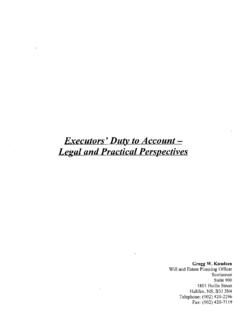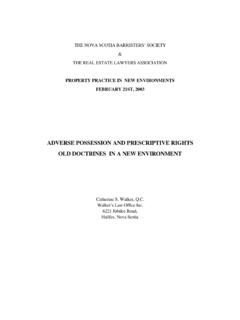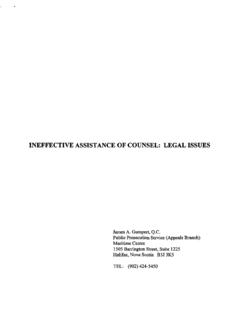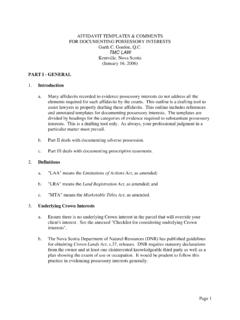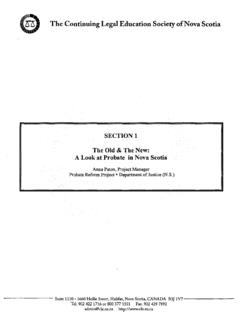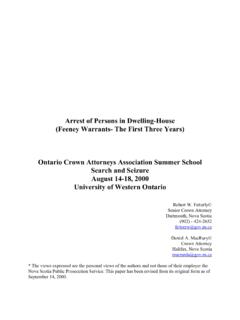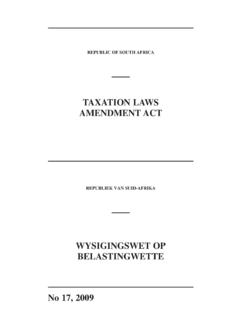Transcription of Attorney. I will deal with these issues under separate ...
1 CORPORATION SEALS AND POWERS OF ATTORNEY I have been asked to address a few practical issues which arise in real estate practice concerning corporations and Powers of Attorney. I will deal with these issues under separate headings below: 1. Must the Corporate Seal be affixed to a deed from a corporation in order for the deed to be valid? This question involves a consideration of property law, corporate law and practice among solicitors and at the Registries of Deeds. In property law we must distinguish between a deed and a conveyance. A deed by definition is an instrument written on paper sealed by the party executing it and conveying a property interest or creating an obligation. See Halsbury's Laws of England, 4th Edition, Volume 12, para.
2 1301. So by definition a corporation would have to affix its corporate seal to create a valid "deed". However, conveyance of real property may not require a deed. Although there is no clear jurisprudence settling this issue in Nova Scotia, I consider that where a conveyance is made for good or valuable consideration, section 12 of the Conveyancing Act, 1989, validates such conveyance where the following provisions are satisfied: 12. Except in the classes of conveyances where an e~actment prescribes the mode of execution and in addition to any other mode now in use a conveyance is validly executed where it is: (a) Signed by the party who conveys or some other person in his presence by his direction, or by his attorney; - 2 -(b) Sealed by the party who conveys or some other person by his direction, or is given for good or valuable consideration; and (c) Delivered or, in the case of a deed poll, published and declared.
3 "Party" is defined in section 2(b) to include any body corporate, as well as an individual. An unsealed conveyance from an individual given without good or valuable consideration may even be valid if Butt v. Humber (1976), 6 207 (Nfld. ) is followed in Nova Scotia. Goodridge, J. states at page 219: "We surely should no longer consider a red wafer seal, or printed words importing a seal, or symbolic action such as placing one's thumb on a deed as things of magic, transforming an instrument or other document into a deed. Surely a man's signature is as good as, or even, better than his seal." Goodridge, J. continues at page 220: "I am of the opinion therefor that where an instrument duly signed by the grantor, purporting to convey a present interest in land to the grantee, delivered to the grantee, accompanied by the delivery of possession (vacant or otherwise) to the grantee if he is not then already in possession, the interest which is purported to be thereby conveyed, (or the present interest of the grantor therein if that is less than what he purports to convey) passes thereby to the grantee notwithstanding that the instrument is not sealed and was not executed for good or valuable consideration.
4 " -3 -Although the Conveyancing Act does not state that a conveyance must satisfy , it is possible a Court would not validate an unsealed conveyance given without consideration and I would be hesitant to rely on the authority of Butt v. Humber in Nova scotia. Where the grantor is a corporation, additional factors relating to corporation law apply. The common law required a corporation to evidence its acts by its common seal, see: Kootenay savings Credit union v. Toudy et al (1987) 48 68 ( ) at page 72. This requirement was relaxed significantly by provisions in corporations statutes. For example, with respect to a company incorporated under the Canada Business corporations Act, (" ") section 23 states: "An instrument or agreement executed on behalf of a corporation by a director, an officer or an agent of the corporation is not invalid merely because a corporate seal is not affixed thereto.
5 " similar provisions are found in a number of other Federal Statutes such as of the Bank Act, 1991, For companies incorporated under the Companies Act, 1989, , the following provision is relevant: "101(1) contracts on behalf of a company may be made as follows: (a) Any contract which if made between private persons would be by law required to be in writing and if made according to the law of the Province or of the Dominion of Canada, to be under seal, may be made on behalf of the - 4 -company in writing under the common seal of the company, and may in the same matter be varied or discharged; (b) Any contract which if made between private persons would be by law required to be in writing, signed by the parties to be charged therewith, may be made on behalf of the company in writing signed by any person acting under its authority, express or implied, and may in the same manner be varied or discharged; (c) Any contract which if made between private persons would by law be valid although made by parol only, and not reduced into writing, may be made by parol on behalf of the company by any person acting under its authority, express or implied, and may in the same manner be varied or discharged.
6 " The wording in the Nova scotia Companies Act appears narrower than in the because in the former only the word "contract" is used and in the latter the words "instrument or agreement" is used. I would submit that a conveyance given for good or valuable consideration would be considered a "contract" within the meaning of the Nova scotia Companies Act because a contract is an agreement supported by consideration. Thus, there would be no material difference between the provisions of the and the companies Act for such a conveyance with consideration. However, I would submit that a conveyance without consideration would not be by definition a "contract" and would therefore require a seal to be valid under the Nova scotia Companies Act, although it would likely be considered an instrument under the.
7 -5 -other relevant statutory provisions include the Corporations Miscellaneous Provisions Act, 1989, , states as follows: "13 (1) Every contract made or entered into by any corporation within the scope of its charter or act of incorporation, under such conditions and circumstances and in such manner that the same would be valid and binding if the corporate seal were affixed thereto, shall be so valid and binding notwithstanding the failure or omission to affix a seal. (2) This section shall not make valid any contract of a corporation which, if made by any person other than a corporation, would be "invalid for want of a seal. (3) The affixing of a seal to the contract of a corporation shall have the same effect as the affixing of a seal to the contract of an individual.
8 " The above paragraph applies to "any private company" and not just to companies incorporated in Nova scotia or under any particular legislation in Nova Scotia, but adds little to (1) of the Companies Act. section 42 of the corporations Miscellaneous Provisions Act applies to companies incorporated under authority of an act of the legislature of Nova scotia (other than the Companies Act) appears to be worded more broadly because it extends to " acts " and not merely "contracts". It states as follows: - 6 -"42 The acts of any company performed within the scope of its charter or act of incorporation shall be valid, notwithstanding they are not done under or authenticated by the seal of the As any conveyance must be registered to preserve its priority, I refer to the Registry Act, 1989, , which requires that before any instrument is registered the execution thereof shall be proved as specified in the Act.
9 States as follows: Subsection 2 "30(2) Any instrument may be registered where the signature of one or more of the parties thereto is proved. II Thus, the Registry Act does not require a seal before an instrument may be registered and I understand that the Registries of Deeds will accept an unsealed conveyance for registration, as they should do, in my view. Some support for the foregoing propositions can be found in the Kootenay Savings Credit Union case (supra) which considered an obscure issue of whether undisclosed principals can sue or be sued on a mortgage made on their behalf. The British Columbia Supreme Court drew a distinction between those rules applicable to individuals and those to corporations. The Court stated that at common law an unsealed contract of a corporation is enforceable nei ther by nor against a corporation.
10 The Court referred to sections in the British Columbia Company Act which are virtually in the same language as of the Nova scotia Companies Act and the Court concluded that a mortgage executed by a corporation without its corporate seal would be effective against the corporation. In - 7 -that case, however, the mortgage could not have been recorded at the Land Titles Office because of a provision in the Property Law Act, 1979, requiring an instrument executed by a corporation to be executed under its corporate seal in order to be registrable. Thus, I conclude that if a conveyance executed by a corporation without corporate seal is given for good and valuable consideration, it is valid. However, where a conveyance is given without good or valuable consideration and without corporate seal, I would anticipate a Court would not uphold the conveyance if granted by a company governed by the Nova scotia Companies Act.

